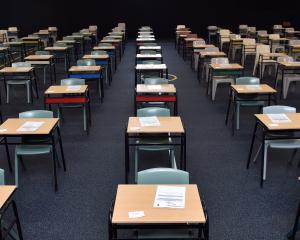Almost a year ago, it was reported that the biggest gains in national certificate of educational achievement pass rates were from pupils in some of the country's lowest decile schools.
The obvious connection that the NCEA examination system somehow made achievement easier appeared to be supported by some of the raw data: a decile 1 college in Northland raised its pass rate for NCEA level 1 by year 11 (fifth form) from 11% to 65% in five years; a school among the poorest in Auckland raised its pass rate from 28% to 63%.
Prof Russell Bishop, of Waikato University, explained that, in general, average pass rates increased faster at poorer schools, partly because of the "ceiling effect" in high-decile schools drawing pupils from wealthy areas, where it was difficult to achieve better results than were already being recorded.
But this apparent disparity does not mean the NCEA should be abandoned: obviously, much depends on the effort being made by low-decile schools to encourage their pupils to do better, and to foster a better understanding by parents of education's importance.
In many low-decile schools this is just what is being done, to the very considerable credit of principals and teachers.
Indeed, in parts of South Auckland, where achievement has all too often been measured by the crime statistics, a most creditable effort in raising education standards from infant to high school levels is beginning to succeed - unheralded and largely unnoticed - because of the work of teacers and parents.
Has NCEA been a factor, given the criticisms that the system makes passing standards easy? Perhaps, but in a world where passing any standard is an achievement, such criticisms are irrelevant.
The relative fuss, therefore, over Auckland Grammar's decision not to offer NCEA to its year 11 pupils this year, should be considered in its proper context.
A growing number of schools are now offering alternatives, most usually the British-based Cambridge exam, with nearly 60 making this choice last year. Auckland Grammar first began using the Cambridge exams in 2001 on the grounds that excessive internal assessment takes place under the NCEA system.
Top-decile schools such as Auckland Grammar - with almost all pupils drawn from high socio-economic families - usually offer pupils a choice of either Cambridge or NCEA. It is not unusual for as many as 80% of pupils to opt for the external system. Private schools are no exception, but often choose an alternative, the International Baccalaureate.
The significant difference this year is that Auckland Grammar will not be offering the NCEA at year 11 - with just enough exceptions to get around the rules - and some other schools may follow suit.
It is an important change because taxpayers fund Auckland Grammar and some may well feel the school does not have the right to determine the means by which its pupils will be assessed.
Grammar's decision will also mean pupils passing the Cambridge exams will proceed to their next two years outside the NCEA system, doing Cambridge studies.
It may be a surprise to some parents that state schools can actually make these choices; but while that was once the case, it is no longer.
The NCEA is not a legal requirement for schools - curiously, however, the taxpayer still at least partially funds the alternative systems such as Cambridge in state schools - and provided the change is supported by the school's board of trustees and a majority of parents (as at Auckland Grammar) it can be implemented.
In short, post-Tomorrow's Schools, parents alone are responsible for decisions about their children's education.
But there are fish-hooks: schools are required to offer a nationally and internationally recognised qualifications system, which, so far as the Ministry of Education is concerned, the Cambridge system is not.
Auckland Grammar is getting around this difficulty by offering some NCEA subjects for weaker pupils. Where this leaves the Government and the Minister of Education, Anne Tolley, is anyone's guess.
Mrs Tolley has offered nothing of substance in comment, merely saying she has full confidence in the NCEA.
Of course, cynics might view her and the Government's relative silence as endorsing choice in education, something the right-wingers in the National Party and its Act New Zealand supporters very much favour.
And, since the schools opting for stepping outside the state-endorsed examination system are invariably filled with pupils from the wealthier end of the social spectrum, the political silence from the centre-right may well be the silence of approval.
But if the trend to reject NCEA in favour of end-of-year unendorsed imports continues, then taxpayer funding to state schools should be tied to the number of pupils sitting NCEA: in short, let the market pay.



